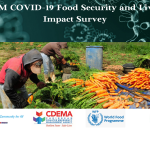EDITORIAL – Adjusting to the COVID-19 culture shock

(Barbados Today Editorial) “Isolation”, “social distancing”, “self-quarantine”, “lockdown” and “curfew” have become buzzwords all over the world since the beginning of the year when the COVID-19 outbreak sent the whole planet into a tailspin.
In the beginning, it was merely a news story happening elsewhere in the world, but over the last two weeks when Barbados moved from two reported cases to 30, those five terms have become part of the everyday vocabulary, and for the foreseeable future, too.
In all honesty, isolation and especially social distancing – not gathering in large groups anywhere or not greeting people with a friendly hug, handshake or otherwise – are foreign to most people.
Humans are social animals. No man is an island. Herein lies the dilemma everyone is facing in the wake of this pandemic, where we have to go against our natural inclinations in our efforts to protect our fellow citizens.
Yesterday, our COVID-19 czar, Richard Carter, lamented the fact that Barbadians were not complying with the guidelines the Government had laid down and he still saw people mingling a little too closely with each other when he was out on the road.
But public transport appeared more disciplined than normal as buses were not filled to capacity, obviously, since many businesses were either closed or opening for fewer hours and children are on vacation from school. And there was definitely evidence of social distancing on board buses with one passenger per seat and people sitting far away from each other at bus stops.
In the United Kingdom, where restrictions on movement have been in place since March 23, initially for three weeks but now likely to last for at least another six months, there are strict rules governing when and why people can leave their homes. These are: “For exercise – once a day, either alone or with members of the household; shopping for basic necessities – although this should be done as little as possible, medical needs, either for yourself or someone else, and travelling to and from work if necessary,” according to Britain’s National Health Service.
Social distancing, where ideally you should stand at least two metres (six feet) away from another person, is crucial because according to all the experts, coronavirus spreads when an infected person coughs or sneezes and releases droplets of the virus into the air. You may either breathe them in, or they can cause an infection if you touch a surface on which they have landed and then put your hands in your face.
The NHS has also advised certain vulnerable groups not to venture out for at least 12 weeks, a practice known as “shielding”.
To our knowledge, the restrictions in Barbados do not speak to this as yet, but given our high rate of chronic non-communicable diseases and the fact that people with underlying health conditions are more susceptible to a lethal infection of COVID-19, this might be helpful.
In the UK, shielding applies to people with certain types of cancer; organ transplant patients; people with certain genetic diseases; people receiving certain drug treatments which suppress the immune system; people with respiratory conditions such as cystic fibrosis and severe chronic bronchitis and pregnant women with heart conditions.
Yes, staying at home is unusual for those who work long hours or who spend prolonged periods of time socialising, but instead of looking at it as ‘cramping your style’ or being ‘cooped up’, the conditions that lead to “cabin fever”, especially if the curfew period goes beyond the initial two-week window, we urge you try to gain some benefits from isolation.
For some, it can be a time to get some extra rest, tend to some outstanding chores around the home, reconnect with your household and other relatives via social media, relax with some good books or movies, or embark on a project you have been putting off for a while because you just haven’t had the time to do it owing to your busy schedule.
Having to become somewhat anti-social is unusual for many of us, but COVID-19 is a highly contagious and rapidly spreading disease. So let us just accept that after-work limes with our work colleagues, hanging out at the village shop or bar, and even “liming on the block” are out of the question for now.
Also, since all supermarkets, shops, convenience stores and gas stations are operating for shorter hours now, maximise the time you spend there; that is, ensure you get everything you need in one trip since “nipping out to get one or two items” is impractical.
These changes are difficult to swallow now, but as St Paul in the Book of Romans said: “All things work together for good”.
Once we comply with the rules and follow the safety protocols, the world will overcome this disease and the lessons learned here will make us better prepared for any other eventuality of this nature that may come our way. And after all this, we may become better at being human, too.
Source: CARICOM TODAY

 Previous Post
Previous Post Next Post
Next Post